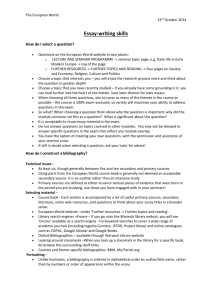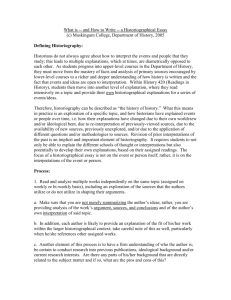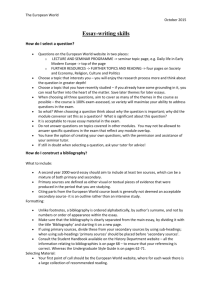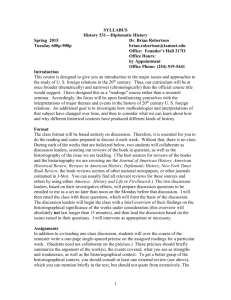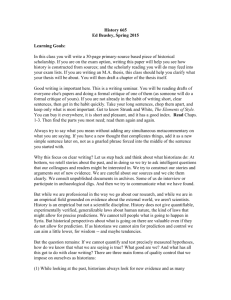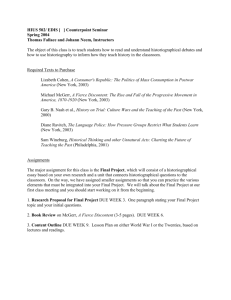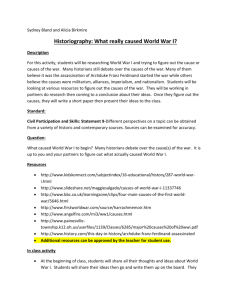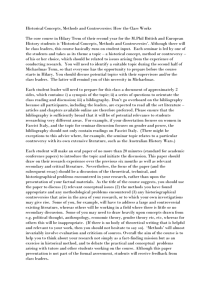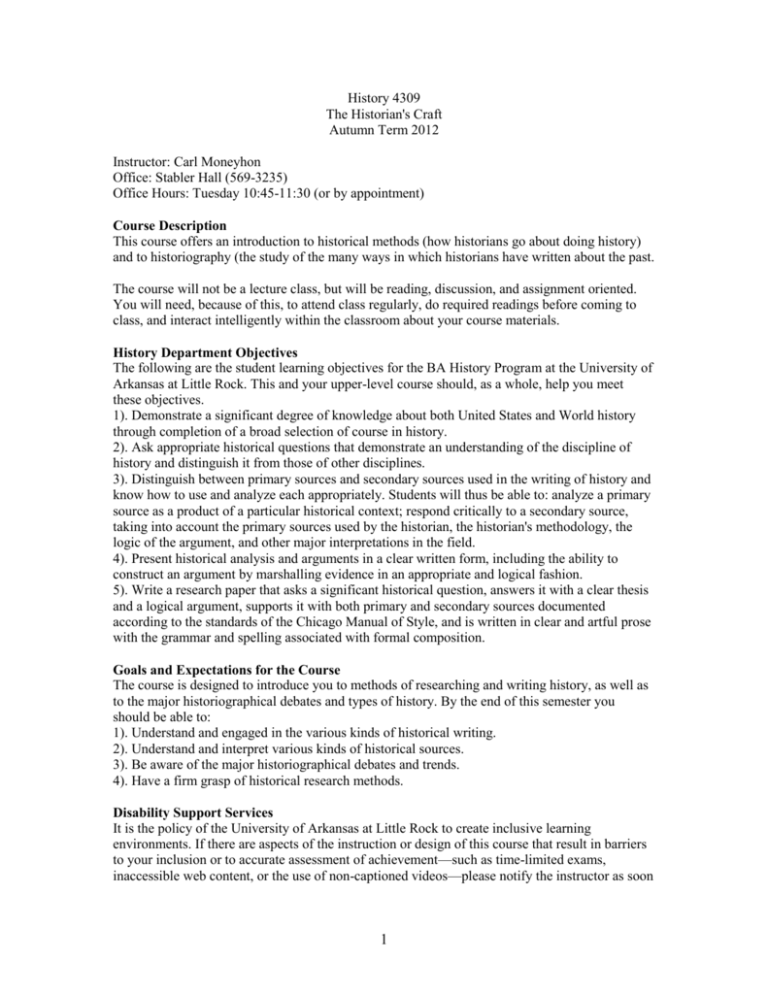
History 4309
The Historian's Craft
Autumn Term 2012
Instructor: Carl Moneyhon
Office: Stabler Hall (569-3235)
Office Hours: Tuesday 10:45-11:30 (or by appointment)
Course Description
This course offers an introduction to historical methods (how historians go about doing history)
and to historiography (the study of the many ways in which historians have written about the past.
The course will not be a lecture class, but will be reading, discussion, and assignment oriented.
You will need, because of this, to attend class regularly, do required readings before coming to
class, and interact intelligently within the classroom about your course materials.
History Department Objectives
The following are the student learning objectives for the BA History Program at the University of
Arkansas at Little Rock. This and your upper-level course should, as a whole, help you meet
these objectives.
1). Demonstrate a significant degree of knowledge about both United States and World history
through completion of a broad selection of course in history.
2). Ask appropriate historical questions that demonstrate an understanding of the discipline of
history and distinguish it from those of other disciplines.
3). Distinguish between primary sources and secondary sources used in the writing of history and
know how to use and analyze each appropriately. Students will thus be able to: analyze a primary
source as a product of a particular historical context; respond critically to a secondary source,
taking into account the primary sources used by the historian, the historian's methodology, the
logic of the argument, and other major interpretations in the field.
4). Present historical analysis and arguments in a clear written form, including the ability to
construct an argument by marshalling evidence in an appropriate and logical fashion.
5). Write a research paper that asks a significant historical question, answers it with a clear thesis
and a logical argument, supports it with both primary and secondary sources documented
according to the standards of the Chicago Manual of Style, and is written in clear and artful prose
with the grammar and spelling associated with formal composition.
Goals and Expectations for the Course
The course is designed to introduce you to methods of researching and writing history, as well as
to the major historiographical debates and types of history. By the end of this semester you
should be able to:
1). Understand and engaged in the various kinds of historical writing.
2). Understand and interpret various kinds of historical sources.
3). Be aware of the major historiographical debates and trends.
4). Have a firm grasp of historical research methods.
Disability Support Services
It is the policy of the University of Arkansas at Little Rock to create inclusive learning
environments. If there are aspects of the instruction or design of this course that result in barriers
to your inclusion or to accurate assessment of achievement—such as time-limited exams,
inaccessible web content, or the use of non-captioned videos—please notify the instructor as soon
1
as possible. Students are also welcome to contact the Disability Resource Center, telephone 501569-3143 (v/tty). For more information, visit the DRC website at http://ualr.edu/disability.
Academic Integrity
All of your work must reflect your own thoughts, words, opinions, and efforts. Cheating and
plagiarism are serious offenses and reflect on your personal character and professionalism. All
sources, including information gathered on the Internet, must be correctly cited in weekly
assignments, papers, and essays. You should include footnotes and a bibliography in Chicago
Manual of Style-Humanities format in all History Department papers unless instructed otherwise.
It is your responsibility to ensure that you understand the definition of plagiarism, and that you
avoid it. Not knowing the definition of plagiarism is not an acceptable excuse for plagiarizing.
Academic dishonesty of any kind will not be tolerated in this class, and you will receive a zero
for a plagiarized assignment. If you are unclear about what constitutes academic dishonesty,
please ask me, and look at section VI of the UALR student handbook.
Attendance Policy
Because of the amount of state and federal funding received by the university and our students,
the university is required to document student attendance. Attendance will be taken at each class
and excessive absences will factor into your final grade. If you experience an illness or other
crisis that prevent you from coming to class you must notify me within 48 hours of the first
missed class. Attendance in class is essential to doing well in the course. Arrive at class on time,
turn cell phones to silent and place them out of sight so that our class time is not distracted by
personal matters.
Assignments, Requirements, and Critical Dates
Overview of Assignments. All of the written work in this class is intended to show you
how to develop a research project. It will be useful for you to determine a problem that
you would like to examine this semester and direct all of the written assignments to
addressing it.
Class Participation (10 percent). Class participation includes attendance and active
participation in class discussion. Frequent unexcused absences, not participating in class
discussion, clearly not reading before coming to class, or inappropriate behavior will be
reflected in your final participation grade.
Article Analysis (Due September 11) (15%) Choose a scholarly article on any subject
and write an analysis according to the assigned readings. It is advisable to pick an article
on a topic on which you would like to focus so that it may be used in your bibliography,
historiography, and research proposal. Your critique should be no more than 3 pages (750
words). You are not to summarize the article but rather to identify its thesis and the
components of the author's argument. This assignment aims at further developing your
critical, analytical, and writing skills.
Book Review (Due September 18) (15%) Choose a scholarly book on any subject and
write a book review according to the guidelines provided in the assigned readings.
Choosing an appropriate book is part of this assignment. You must clear your choice with
me. This assignment should be no more than 3 pages (750 words). It is intended to
develop your skills at identifying the thesis and main points of the book and to critically
assess the value of its argument.
2
Annotated Bibliography (Due October 2) (15%) Using the skills you have acquired in
doing a literature search prepare an annotated bibliography that focuses on a particular
subject of your choice. The annotation should include information on the basic question
asked in each work and the author's thesis. These works must be shown to address
directly the subject you have chosen. It should include at least ten relevant secondary
sources. You may use book reviews of monographs in helping to prepare this
bibliography.
Historiography (Due October 11) (15 percent) Choose three books that focus on a
similar question or event and write a historiographical essay according to the guidelines
provided in the assigned readings. One of the books can be the book you used in your
book review. Your essay should be 3-5 pages long. It is intended to help you critically
evaluate, compare and contrast leading books on a given topic. When you write your
capstone paper as part of the senior seminar you will e required to include a
historiographical section so this will be good practice.
Primary Source Analysis (Due October 30) (15 percent). Your assignment is to find
two primary sources that examine the same event or issue that reflect conflicting or
contradictory viewpoints. You will analyze the documents based on the questions
discussed in class. You should compare and contrast the documents. How do they differ?
How are they the same? What document appears more credible and why? This
assignment should be analytical rather than narrative. You should not simply summarize
what your documents say. The assignment must be a minimum of 500 words and no more
than 1000 words. It should show critical analytical thinking and writing skills.
Research Proposal (15 percent) This assignment is to write a 4-6 page research
proposal in which you clearly articulate the question you are trying to answer, how your
question fits within existing historiography, and at least ten relevant secondary and four
relevant primary sources. This may include material from your previous assignments.
A Word On Written Work: All written assignments must be submitted in hard
copy. They should be typed using a 12 point font. They are to be double spaced
using a standard 1" margin on all sides. Never submit a paper that you have not
submitted to spell-check and grammar-check. You should proofread all papers
before their submission.
Texts
Benjamin, Jules R. A Student's Guide to History. Boston: Bedford/St. Martin's, 2010. 11th
Edition.
Gilderhus, Mark T. History and Historians: A Historiographical Introduction. Upper Saddle
River, N. J.: Prentice Hall, 2010. 7th Edition.
Rampolla, Marry Lynn. A Pocket Guide to Writing History. Boston: Bedford/St. Martin's, 2012.
7th Edition.
Course Schedule and Assignments
Unit 1: What Is History?
Aug. 23
Introduction
3
Sept.
28
Discussion—"Succeeding in your History Class," in Jules R. Benjamin, A
Student's Guide to History, 11th edition. (Boston: Bedford/St. Martin's, 2010),
pp. 12-24. Task—Bring with you to class to hand in the title of a book that you
would like to read as the basis for a written review.
30
Discussion—Why Study History--"Why Study History," in Mary
Lynn Rampolla, A Pocket Guide to Writing in History (Boston: Bedford/St.
Martin's, 2010), 1-5; "The Nature and Value of History," in William H.
McDowell, Historical Research: A Guide (London: Longman, 2002), pp. 3-14;
Richard Carrier, "The Function of the Historian in Society," The History
Teacher, 35 (August 2002), pp. 519-526.
4
Discussion—Historical Objectivity—Henry Ashby Turner, "Peter Novick and
The Objectivity Question in History," Academic Questions, 8 (Summer 1995),
pp. 18-27; Peter Novick, "My Correct Version of Everything," American
Historical Review, 93 (June 1991), pp. 699-703.
Unit 2: Historical Analysis and Interpretation
6
Secondary Sources—Discussion--Patrick Rael, "How to Read a Secondary
Source," http://www.bowdoin.edu/writing-guides; "Predatory Reading,"
http://www.bowdoin.edu/writing-guides/predatoryreading.htm; "Evaluating
Secondary Sources," Rampolla, A Pocket Guide, pp. 16-21.
11
Secondary Sources—Task/Written Assignment—Find an appropriate
Article in a scholarly historical journal. Applying the readings from the last
class, provide an analysis of that article to be turned in. Be prepared to discuss
your analysis.
13
Secondary Sources—Discussion—"How to Write a Book Review,"
http//www.lavc.edu/Library/bookreview.htm; "Book Reviews," in Richard
Marius and Melvin E. Page, A Short Guide to Writing About History (New
York: Pearson-Longman, 2007), pp. 209-220.
18
Secondary Sources—Task/Written Assignment—Prepare a review of
the book that you have chosen using the advice provided in your previous
readings. Your review should use the form that you have seen in scholarly
journals with a heading that includes the full citation of the reviewed book. Be
prepared to discuss your book reviews before turning them in.
Unit 3: The Research Paper--Getting Started
20
Developing the research bibliography—The class will meet at the
Ottenheimer Library for a presentation on virtual and actual research tools
needed to develop a research bibliography. Reading Assignment—"Researching
a History Topic," in Benjamin, A Student's Guide to History, pp. 88-127.
25
Historical Sources—Discussion—"Planning a Research Project," in McDowell,
Historical Research, pp.78-92;
27
Notes—Discussion—"Research Notes," in McDowell, Historical Research, pp.
126-132; "Taking Notes," in Marius and Page, A Short Guide to Writing About
History, pp. 106-117.
4
Oct.
2
Documenting Sources—Discussion—"Documenting Your Paper," in Benjamin,
A Student's Guide to History, pp. 116-127, 173-199; "Documenting Sources," in
Marius and Page, A Short Guide to Writing History, pp. 173-192. ** "Annotated
Bibliographies" in Rampolla, A Pocket Guide, pp. 28-29; Task/Written
Assignment. Turn in an annotated bibliography of books and articles that are
connected with your research project. You must use proper forms of citation.
Unit 4: The Research Paper—The Historiographical Framework
4
The Historiographical Essay—Discussion—"What is – and How to Write
– a Historiographical Essay," w.muskingum.edu/dept/history/
downloads/Historiograpical Essay.doc.
9
The Historiographical Essay—Discussion—""in Carl H. Moneyhon, The Impact
of the Civil War and Reconstruction on Arkansas: Persistence in the Midst of
Ruin (Baton Rouge: Louisiana State University Press, 1994), pp. 1-9.
11
Historiographical Essays—Task/Discussion—Historiography
16
Historiographical Essays—Task/Discussion (cont.)
Unit 5: The Research Paper—Working with Primary Sources
18
Primary Sources—Discussion—"Working with Historical Evidence," in
Benjamin, A Student's Guide to History, pp. 25-50; "How to Read a Primary
Source," in Rael, Reading, Writing and Researching for History, pp. 16-19.
http://www.bowdoin.edu/writing-guides.
23
Primary Sources—The Reliability of Oral History—Discussion—Linda Shopes,
"Making Sense of Oral History," http//historymatters.gmu.edu/mse/oral/
25
Primary Sources—Films and Doccumentaries—Discussion—Robert Brenton
Toplin, "The Filmmaker as Historian," American Historical Review, 93
(December 1988), pp. 1210-1227.
30
Primary Sources—Task/Discussion—Find a primary source on a topic related to
the research problem you are addressing. Apply the concepts of analysis
discussed in the last class to this document and interpret it. Bring your source to
class, present it, and discuss your interpretation of it.
.
Nov.
1
NO CLASS
6
Primary Sources—Task/Discussion—presentations continued
Unit 6: The Research Paper—Putting It Together
8
The Research Proposal—Discussion—How to Write a History Research
proposal," http://facstaff.uww.edu/jaffej/seminar/proposal.pdf.
13
Good History—Discussion—"Taking Notes and Writing Drafts," in Marius and
Page, A Short Guide to Writing About History, pp. 106-126, 150-172, "The
Preparation of Drafts," in McDowell, Historical Research, pp. 133-143; see also
5
"Following conventions of Writing History," in Rampolla, A Pocket Guide, pp.
49-76.
15
Good History—Independent Individual Work—The Problem of Plagiarism—
Discussion—John Dihtl, "Teaching Integrity," The History Teacher, 36 (May
2003), pp. 367-373.
Unit 7: Approaches to History—How Historians Look at the World
20
"Historical Consciousness in the Modern Age," in Mark T. Gilderhus, History
and Historians: A Historiographical Introduction (Upper Saddle River, NJ:
Pearson/Prentice Hall, 2007), pp. 29-49.
Dec.
22
THANKSGIVING
27
"Philosophy of History: Speculative Approaches," Gilderhus, History and
Historians, pp. 50-69.
29
"Philosophy of History: Analytical Approaches," Gilderhus, History and
Historians, pp. 70-85.
4
"Professional History in Recent Times," Gilderhus, History and Historians, pp.
86-110.
6
"Culture Wars, Postmodernism, and Other Issues," in Gilderhus, History and
Historians, pp. 111-125.
11
CONSULTATION DAY—Task/Research proposals Due at office by 4:00
6

